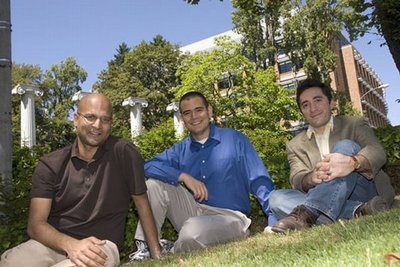September 27, 2007
Technology Review honors 3 UW engineers
If you pick up a copy of Technology Review magazine this month, you’ll see this year’s winners for the top 35 young innovators. Then again, you might bump into a handful of the winners on campus.
Technology Review named three members of the UW’s College of Engineering for the TR35, a list recognizing the world’s top 35 innovators under the age of 35. One of the winners was also named Humanitarian of the Year for creating technology for the developing world.
“I’m extremely proud of our three TR35 winners, and thrilled to be congratulating three winners in one year,” said Matthew O’Donnell, dean of the College of Engineering. “This speaks to the exceptional talent we’ve been able to attract to the College.” He added: “Top-notch young engineers choose the University of Washington because we have a culture that supports creative, interdisciplinary work.”
The Humanitarian of the Year award went to Tapan Parikh, 33, who recently defended his doctoral thesis in the Department of Computer Science & Engineering. Parikh’s graduate work used cell phones as portable banking systems for microcredit groups in rural India. Parikh, who is advised by professors Ed Lazowska and David Notkin in the Department of Computer Science & Engineering, works on other projects integrating mobile technologies and open-source software to create low-cost, portable tools for agricultural certification and health care diagnoses.
Also honored by the magazine is Babak Parviz, 34, an assistant professor in the Department of Electrical Engineering, who is recognized for his research at the interface of biology and nanotechnology. Parviz works on biologically inspired self-assembly and has used the method to build flexible plastic circuits, nano-scale electronics and low-cost biological sensors for detecting diseases such as HIV.
“For people in our age group, it’s one of the highest awards you can get,” Parviz said. “When I look at the magazine’s history, a lot of the people they’ve picked are pretty good.”
That would be an understatement. Previous TR35 winners include Google co-founders Sergey Brin and Larry Page; Yahoo! co-founder Jerry Yang; and Linus Torvalds, the founding developer of Linux. “It’s a privilege to be part of this group,” Parviz said.
Proving that good things come in threes, the magazine also recognized Yoshi Kohno, 29, an assistant professor in the Department of Computer Science and Engineering. Kohno’s research on digital security has influenced the debate on electronic voting machines. Last winter he and three graduate students found a security flaw in the popular Nike + iPod gadget. The judges recognized Kohno’s earlier research on provable security systems, which improve the safety and privacy of online transactions.
Kohno said he subscribed to the magazine as an undergraduate and was inspired by past winners. “I remember looking at all the interesting things they were doing,” he said. “It’s an honor now to have my own research recognized in the same magazine.'” Although Technology Review was originally founded in 1899 as an alumni publication, it is now an independent media outlet owned by MIT.
“The TR35 judges reviewed each entry independently, looking for innovators whose accomplishments are poised to have a dramatic impact,” said Jason Pontin, editor in chief of the magazine. “It’s very unusual to have three recipients at one institution. We congratulate the three winners, and the University of Washington.”
All three engineers are in Boston this week to accept their awards at the magazine’s Emerging Technologies Conference, where they will meet with previous TR35 recipients and rub shoulders with tech heavyweights such as Kevin Rose, the founder of Digg, and Seattle software architect Charles Simonyi.
“The fact that this award is given early in your career is exciting,” said Parikh, who will begin a faculty position at the University of California, Berkeley this winter. “You’re not being recognized for a whole body of work; your work is being recognized as exciting and promising. But that’s kind of intimidating, too, because people are expecting big things.”
Two of the UW winners are about to cross another milestone: in October Parikh and Parviz will both become fathers for the first time. The babies’ due dates, one day apart, fall about one week after the conference. Both researchers nevertheless flew to Boston to accept the award.
Parviz said he’s hoping the timing works out. “We’ll be carrying our cell phones with us,” he said.



